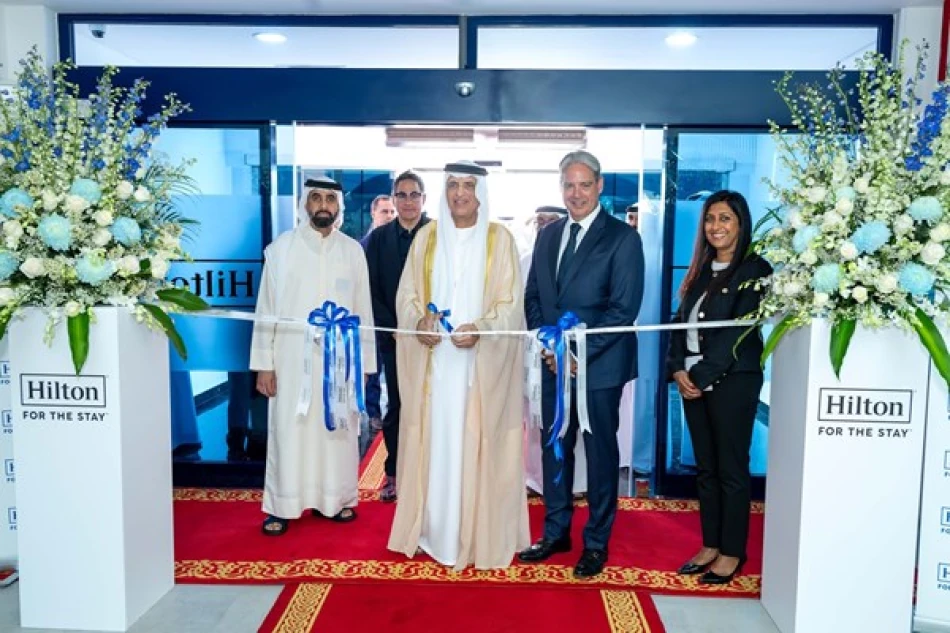
Ras Al Khaimah Welcomes Hilton's New Flagship Office Opened by Saud bin Saqr
Ras Al Khaimah Emerges as UAE's Dark Horse Tourism Destination with Major Hilton Regional Hub
Ras Al Khaimah, the UAE's northernmost emirate, is positioning itself as a serious contender in the Gulf's tourism race by attracting major hospitality players to establish regional operations centers. The emirate's ruler inaugurated Hilton's new regional headquarters, which will oversee accounting and IT operations for 48 hotels across 10 countries, signaling a strategic shift toward becoming a business and tourism hub beyond Dubai and Abu Dhabi's shadow.
Strategic Economic Diversification Beyond Oil
Sheikh Saud bin Saqr Al Qasimi, Ruler of Ras Al Khaimah, emphasized that the emirate's tourism renaissance reflects an ambitious vision to diversify its economy and strengthen its position as a global destination for tourism, living, working, and investment. The tourism sector has become one of the most important pillars of sustainable growth and a vital source for attracting investments and creating employment opportunities.
This move mirrors similar strategies across the Gulf, where emirates and nations are racing to reduce oil dependency. However, Ras Al Khaimah's approach differs from Dubai's mega-project strategy or Abu Dhabi's cultural focus, instead leveraging natural assets and cost advantages to attract both visitors and business operations.
Hilton's Vote of Confidence in Regional Growth
The new Hilton office, located in the RAKEZ Business Center 1 in Al Nakheel area, represents more than just corporate expansion. Guy Hutchinson, Hilton's President for the Middle East and Africa, highlighted that Ras Al Khaimah has become one of the fastest-growing tourist destinations in the region due to its attractive investment environment and advanced infrastructure.
Two-Decade Partnership Paying Dividends
Hilton's presence in Ras Al Khaimah spans over 20 years, making this expansion a natural evolution rather than a speculative bet. The choice to centralize regional operations here suggests confidence in the emirate's business infrastructure and regulatory environment. For multinational hospitality groups, operational efficiency and cost management are crucial factors, particularly as the industry recovers from pandemic disruptions.
Ambitious Tourism Targets Signal Serious Intent
The emirate has set an ambitious target to attract 3.5 million visitors by 2030 as part of its comprehensive vision. This represents significant growth from current levels and positions Ras Al Khaimah as a potential alternative to more saturated destinations like Dubai, which welcomed over 16 million visitors in 2023.
Market Positioning and Competitive Advantages
Unlike its flashier neighbors, Ras Al Khaimah offers natural attractions including mountains, beaches, and desert landscapes without the premium pricing associated with Dubai or Abu Dhabi. This positioning could appeal to cost-conscious travelers and businesses seeking Gulf exposure without major city expenses.
Regional Business Hub Ambitions
The establishment of Hilton's regional operations center supporting 48 hotels across 10 countries demonstrates Ras Al Khaimah's growing appeal as a business services hub. The RAKEZ (Ras Al Khaimah Economic Zone) framework offers companies streamlined operations and potentially favorable tax structures.
This strategy echoes successful models in Singapore and Dubai, where tourism infrastructure supports broader business services sectors. For investors, this diversification reduces reliance on volatile tourism flows while creating sustainable employment in higher-value services.
Investment Implications and Market Outlook
The Hilton expansion signals institutional confidence in Ras Al Khaimah's long-term prospects. For hospitality investors and real estate developers, this represents validation of the emirate's tourism strategy and infrastructure development. The presence of major international brands also enhances the destination's credibility with international visitors and corporate clients.
The emirate's focused approach on sustainable tourism growth, combined with business-friendly policies and natural advantages, suggests it may successfully carve out a distinct niche in the competitive Gulf tourism market. Rather than competing directly with Dubai's luxury positioning or Abu Dhabi's cultural focus, Ras Al Khaimah appears to be building a balanced ecosystem of tourism, business services, and quality of life that could prove attractive to both visitors and residents seeking alternatives to the region's more expensive destinations.
Most Viewed News

 Layla Al Mansoori
Layla Al Mansoori






